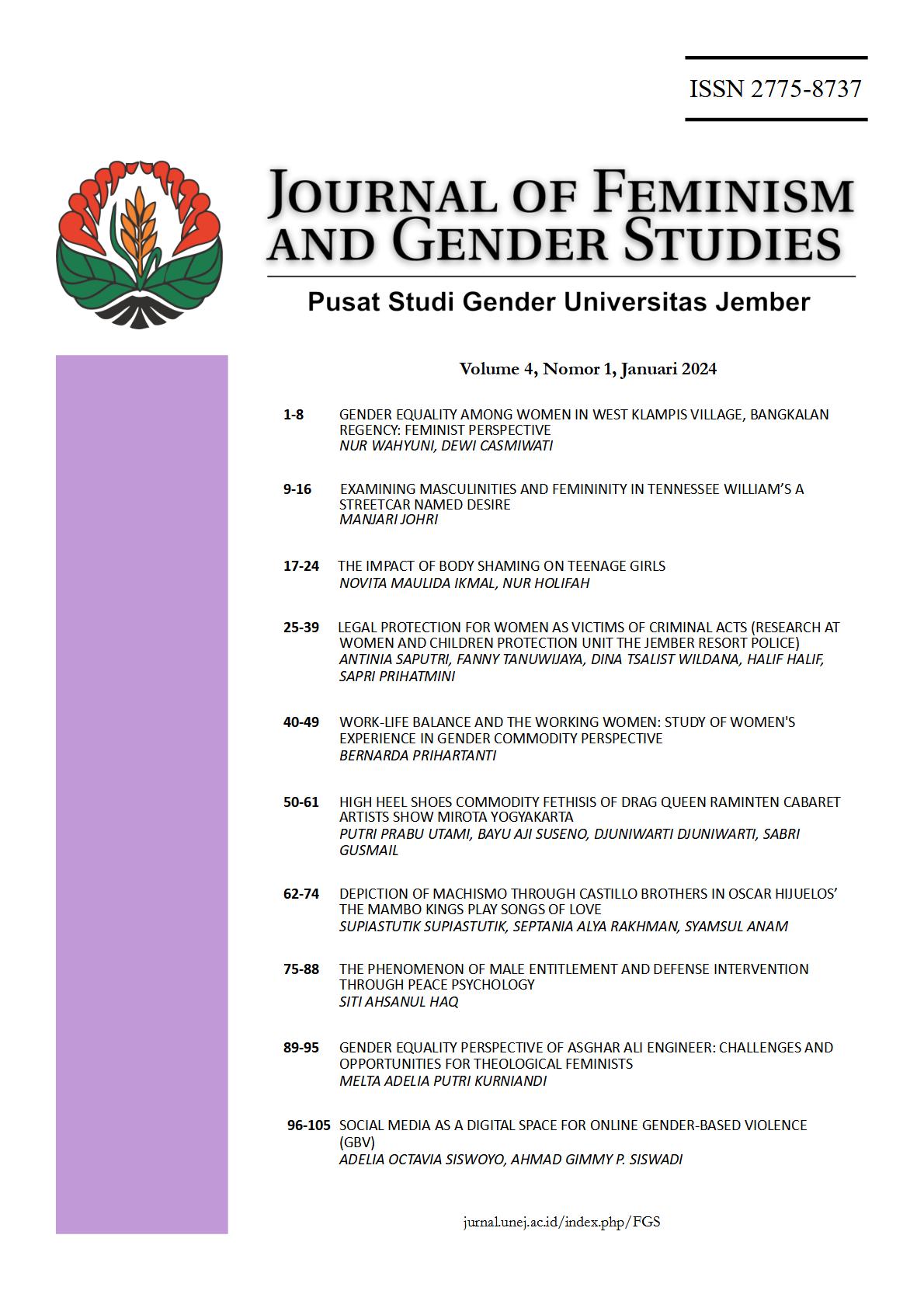Examining Masculinities and Femininity in Tennessee William’s A Streetcar Named Desire
DOI:
https://doi.org/10.19184/jfgs.v4i1.43202Keywords:
Performativity; Gender; Masculinities; Toxic Masculinity; FemininityAbstract
Examining A Streetcar Named Desire through the lens of Gender and Masculinity Studies is an academically enriching and intriguing pursuit. The play, first performed on Broadway in 1947, continues to captivate with its portrayal of the characters of Stanley and Blanche. Stanley’s aggressive masculinity is pitted against the frailty of Blanche, leading to her breakdown and her ultimate escape into the unreal world of fantasy. This study aims to identify different types of masculinities; from Allan Grey’s closeted identity to Stanley Kowalsky's toxic masculinity, and how each affects Blanche Du Bois. It is intriguing to explore whether her distraught emotional state is entirely due to Stanley’s bestial toxicity or whether she is also a victim of femininity which is synonymous with frailty, beauty, and obsession with eternal youth. R.W. Connell’s Masculinities (1995,2005), and Betty Friedan’s The Feminine Mystique (1963) have been used as a framework to evaluate the male and female characters in the play.
Downloads
References
Atkinson, Brooks. “First Night at the Theatre.†The New York Times Web Archive. The New York Times, (December 1947).
Bigsby, C. W. E. A Critical Introduction to Twentieth-Century American Drama: Volume 2, Williams, Miller, Albee. Cambridge University Press,1984: 1- 20
Butler, Judith. Gender Trouble. New York and London: Routledge,2011:33 - 45
Connell, R. W. Masculinities. Second. Berkley Los Angeles: University of California Press,2005:70 - 85
Connell, R. W. Gender and Power. Oxford, Great Britain: Polity Press and Basil Blackwell,1987:49 - 145
Costa, F. n.d. “‘There Was Something Different about the Boy’: Queer Subversion in Tennessee Williams’s A Streetcar Named Desire — University of East Anglia.†University of East Anglia,(2014 ): 77 - 85
Albert J., Devlin, ed., Conversations with Tennessee Williams, “A Playwright Named Tennisonâ€. United States of America: University Press of Mississippi,1986: 25 - 28.
Friedan, Betty. The Feminine Mystique. W. W. Norton & Company,2001:40 - 65
Gibbs, Wolcott. 1947. “Review: ‘A Streetcar Named Desire’ | The New Yorker.†The New Yorker. The New Yorker. (December 1947).
Heintzelman, Greta, and Alycia Smith Howard. Critical Companion to Tennessee Williams. Infobase Publishing,2014: 273 - 275
“Kim Hunter | Interview | American Masters | PBS.†n.d. American Masters. Accessed August 30, 2023a. https://www.pbs.org/wnet/americanmasters/archive/interview/kim-hunter/.
Kolin, Philip C. “The First Critical Assessments of A Streetcar Named Desireâ€, Journal of Dramatic Theory and Criticism, (September 1991).
Murphy, Brenda. Tennessee Williams and Elia Kazan. Cambridge University Press,1991.
JohnM, Clum. “Tennessee Williams (1911-1983)†in The Gay & Lesbian Literary Heritage, ed. Claude J. Summers, New York Henry Holt, 1995.
Whitehead, Stephen M. Toxic Masculinity. Andrews UK Limited,2021:17-20.
Williams, Tennessee. A Streetcar Named Desire. New Directions Publishing,2004.



